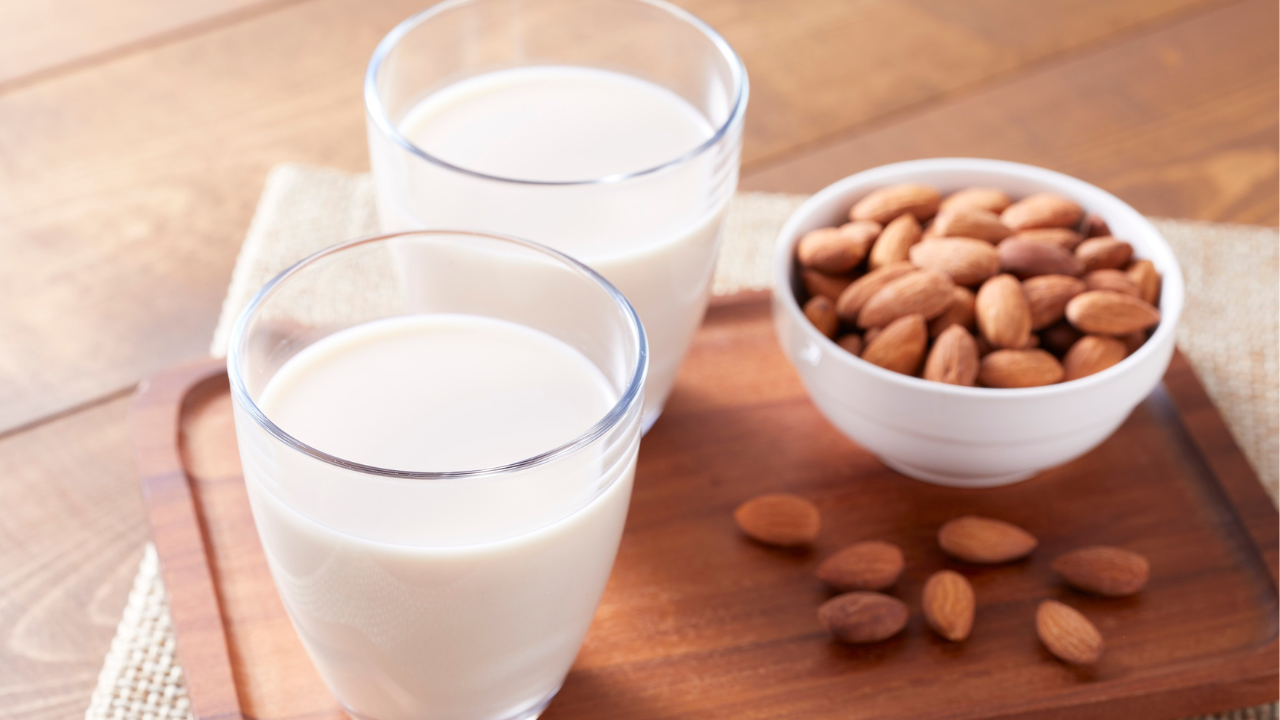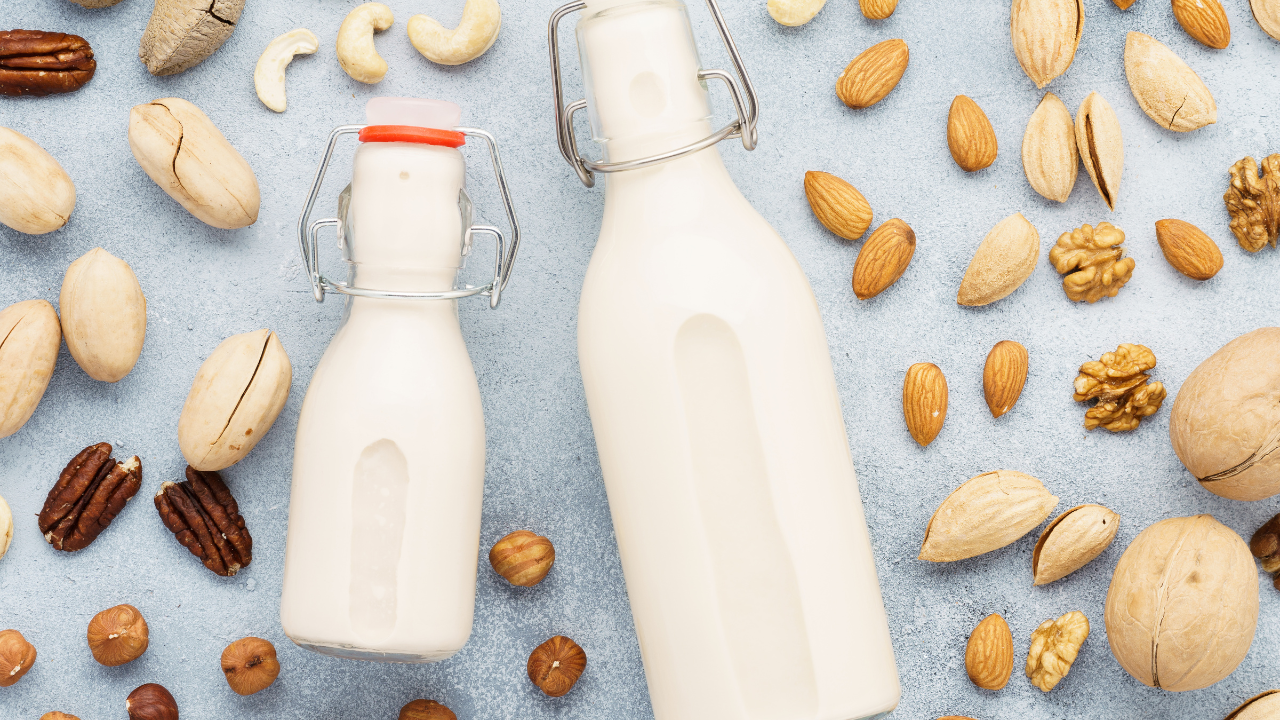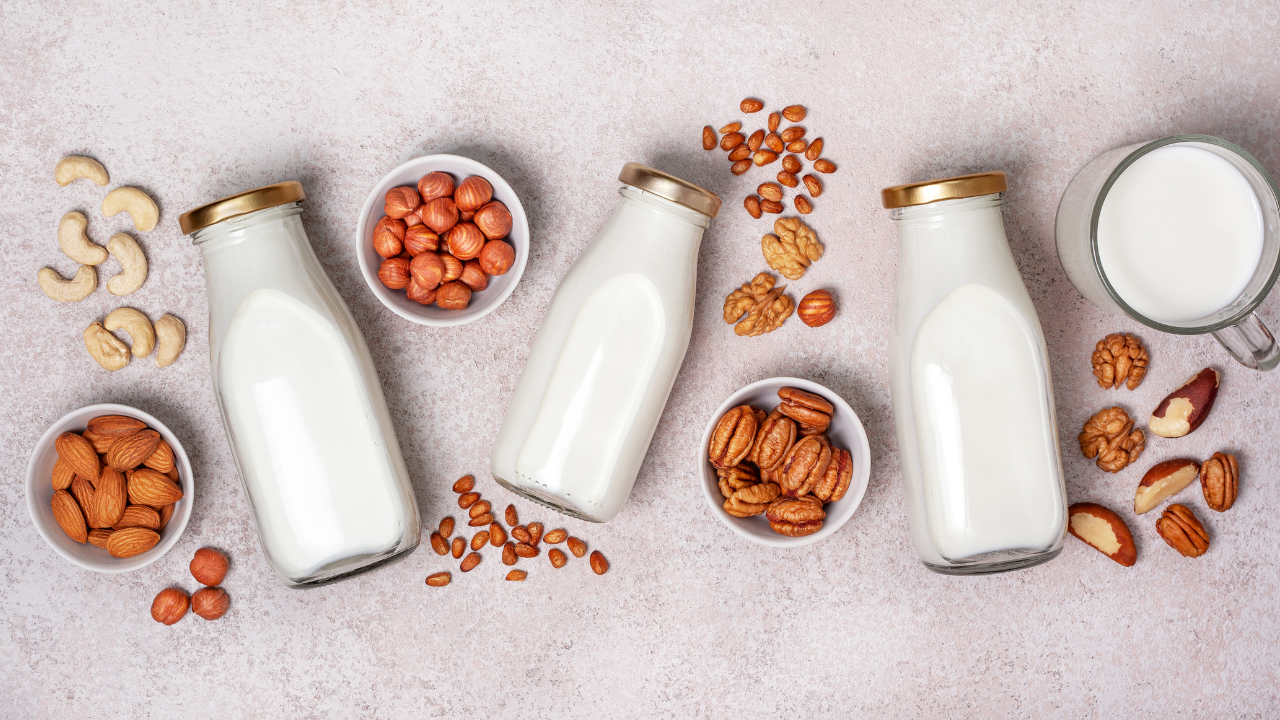Plant-based milk makeover

How to make clean, creamy plant-based milk that actually supports your health...
No gums, no seed oils, no nonsense—just pure nourishment in under two minutes.
If you’ve ever turned a carton of almond or oat milk around and seen a list of ingredients you can’t pronounce, you’re not alone.
What began as a wholesome alternative to dairy has become a highly processed beverage filled with seed oils, emulsifiers, gums, and “fortified” additives that can quietly work against your health goals.
And although real cow-dairy milk shouldn't automatically be considered problematic, if you—or someone you know—are dealing with any kind of inflammation, it’s worth a closer look.
What do I mean by “clean” plant-based milk & why it matters:
You've heard me say it before - Food is information, not just fuel.
Every ingredient you consume sends signals to your cells that either resolve inflammation or fan the proverbial flames.
Most commercial nut and seed milks send the wrong message because they contain:
-
Refined seed oils (sunflower, safflower, canola) — These are typically extracted using heat and solvents, resulting in oxidized omega-6 fats that promote systemic inflammation and oxidative stress【1–3】. Excess omega-6 intake relative to omega-3 can activate inflammatory pathways linked to atherosclerosis and insulin resistance【4】.
-
Emulsifiers and gums (carrageenan, gellan gum, guar gum) — While these improve mouthfeel and shelf life, they can disrupt the gut microbiome and weaken the intestinal barrier (“leaky gut”)【5–7】. Carrageenan in particular has been shown to trigger inflammatory signaling in intestinal tissue【8】.
-
Minimal nut or seed content — Some commercial options contain only 2–5% actual nuts, meaning most of what you’re drinking is fortified water plus stabilizers.
When you make your own, you bypass all of these issues—no gut irritants, no inflammatory oils, no synthetic fillers—just whole-food nutrition your body understands.
What to look for when buying store-bought plant-based milks:
When you do reach for a carton, choose the cleanest option available.
A good rule of thumb: it should read like a short recipe, not a science experiment.
Look for:
✅ Minimal ingredients — ideally just nuts/seeds, water, and salt.
✅ Zero added sugars — check the Nutrition Facts panel; “0g added sugar” should appear on the label.
✅ No added oils — skip those containing sunflower, canola, or safflower oil.
✅ No gums or emulsifiers — like carrageenan, gellan gum, or sunflower lecithin.
✅ Organic or non-GMO whenever possible, especially for soy or oat-based milks.
Some best-in-class options currently include: MALK Organics, Three Trees, or Elmhurst 1925 — all have short, clean ingredient lists and excellent texture without the additives.
Even with the best plant-based options, though, the question isn’t which milk to buy, but whether to include dairy at all.
And the answer to that question is truly individual.
So, what about regular cow-dairy?
To be 100% clear: dairy isn’t automatically “bad” for everyone. For many, high-quality, grass-fed or fermented dairy can be well tolerated.
But for anyone navigating an inflammatory or autoimmune condition—think sinusitis, arthritis, eczema, asthma, digestive issues, or chronic fatigue or pain—dairy can be a quiet, but potent, trigger.
Here’s why:
-
Casein proteins (especially A1 beta-casein found in most conventional milk) can provoke immune activation in certain individuals, leading to subtle inflammation or mucus production (8, 9).
-
Lactose intolerance increases with age as lactase enzyme levels decline, causing bloating, congestion, or skin flare-ups (10).
-
Hormones and saturated fats in non-organic dairy can influence insulin signaling and inflammation in metabolically sensitive individuals (11, 12).
If you suspect dairy is affecting you, try a 4–6 week guided elimination—ideally with a qualified nutritionist who can ensure it’s nutritionally balanced so you only have to do it once, correctly.

Making your own plant-based milk is actually super easy...
Before you think, “Oh please, I don’t have time for that,” know this: homemade nut milk takes less time than brewing coffee. All you need is a good blender, a jar with a tight fitting lid, and your nuts/seeds of choice.
Base formula:
👉 4:1 ratio — 4 cups of water to 1 cup of soaked* nuts or seeds.
Soaking the nuts or seeds overnight softens them, improves texture, and boosts digestibility. (FYI - Hempseeds are the exception—they don’t require soaking.)
I’ll admit, soaking was the step that held me back for years. It sounded fussy—until I realized it takes less time than brushing my teeth.
If you’re a coffee drinker, you may even already have a morning ritual. Just add this tiny step the night before: place 1 cup of nuts in a jar, cover with water, pop on a lid, and refrigerate overnight.
That’s it. Two seconds of effort for a noticeably creamier, easier-to-digest milk.
In the morning, drain the water, rinse the nuts/seeds in fresh water, add 4 cups of fresh water, and blend for about 45 seconds.
Strain if you like—then you’re done. (FYI - I usually use my home-made milks in things like chia seed puddings so I don't bother straining them).
Fresh, clean, and ready to enjoy in under two minutes.
The easiest milks to start making at home are:
-
Hempseed milk — no soaking or straining. High in complete protein, omega-3s, and magnesium (13).
-
Cashew milk — naturally creamy, subtly sweet, and no straining required. Excellent for smoothies (14).
How to use them in hot drinks (i.e., to avoid curdling):
-
Warm your milk first before adding to coffee or tea.
-
Pour coffee into milk, not milk into coffee.
-
Add ½ tsp MCT oil to help it froth. Note, I don't recommend this for anyone navigating elevated cholesterol as MCT oil typically increases LDL.
-
Blend for 10 seconds for a café-quality texture.
-
Add a pinch of cinnamon, vanilla, or sea salt for flavor and stability.
The nutritional advantages of making your own:
-
Heart-healthy fats that reduce inflammation and stabilize blood sugar
-
Magnesium and potassium for healthy blood pressure
-
Protein and polyphenols for energy and oxidative protection
When you make your own, you skip:
-
Industrial seed oils
-
Emulsifiers that disrupt your gut barrier
-
Added sugars that sabotage blood sugar control
-
Dairy proteins that may fuel inflammation
If you're thinking of going dairy-free?
If you’re managing inflammation or gut symptoms, a 4–6 week dairy-free trial can be transformative.
Work with a functional nutritionist to make sure your nutrient bases are covered, and so you can truly gauge how your body responds (and only need to do it once, correctly!).
TL;DR:
Whether you buy or blend, choose plant-based milks that are as close to nature as possible—no oils, no gums, and zero added sugar.
Your heart, gut, and energy will thank you.
References:
-
Simopoulos, A. P. (2002). The importance of the ratio of omega-6/omega-3 essential fatty acids. Biomedical Pharmacotherapy, 56(8), 365–379.
-
Blasbalg, T. L., Hibbeln, J. R., Ramsden, C. E., Majchrzak, S. F., & Rawlings, R. R. (2011). Changes in consumption of omega-3 and omega-6 fatty acids in the United States during the 20th century. American Journal of Clinical Nutrition, 93(5), 950–962.
-
Johnson, G. H., & Fritsche, K. (2012). Effect of dietary linoleic acid on markers of inflammation. Nutrients, 4(11), 1488–1508.
-
Chassaing, B., Koren, O., Goodrich, J. K., Poole, A. C., Srinivasan, S., Ley, R. E., & Gewirtz, A. T. (2015). Dietary emulsifiers impact the mouse gut microbiota promoting colitis and metabolic syndrome. Nature, 519(7541), 92–96.
-
Viennois, E., Bretin, A., Djouina, M., & Chassaing, B. (2020). Emulsifiers directly alter human microbiota composition ex vivo potentiating intestinal inflammation. Gut, 69(4), 696–706.
-
Martino, J. V., Van Limbergen, J., & Cahill, L. E. (2017). Food additives and inflammatory bowel diseases. Journal of Clinical Gastroenterology, 51(9), 806–812.
-
Te Morenga, L., Mallard, S., & Mann, J. (2013). Dietary sugars and cardiometabolic risk: Systematic review and meta-analyses of randomized controlled trials and cohort studies. BMJ, 346, e7492.
-
Jianqin, S., Leiming, X., Lu, X., & Weining, W. (2016). Effects of milk containing only A2 beta-casein versus milk containing both A1 and A2 beta-casein on gastrointestinal physiology and inflammation. Nutrition Journal, 15, 35.
-
Brooke-Taylor, S., Dwyer, K., Woodford, K., & Kost, N. (2017). Systematic review of gastrointestinal effects of A1 vs A2 beta-casein. Critical Reviews in Food Science and Nutrition, 57(16), 3821–3830.
-
Suchy, F. J., Brannon, P. M., Carpenter, T. O., Fernandez, J. R., Gilsanz, V., Gould, J. B., … & Wood, R. J. (2010). NIH consensus development conference: Lactose intolerance and health. American Journal of Clinical Nutrition, 92(4), 981–984.
-
Astrup, A., Magkos, F., Bier, D. M., Brenna, J. T., King, J. C., Krauss, R. M., … & Willett, W. C. (2021). Saturated fats and health: A reassessment. Progress in Lipid Research, 101, 101082.
-
Lajous, M., Bijon, A., Fagherazzi, G., & Boutron-Ruault, M. C. (2020). Dairy food and cardiovascular disease risk. Advances in Nutrition, 11(6), 1343–1352.
-
Callaway, J. C. (2004). Hempseed as a nutritional resource: An overview. Euphytica, 140(1–2), 65–72.
-
Ros, E. (2009). Nuts and novel biomarkers of cardiovascular disease. American Journal of Clinical Nutrition, 89(5 Suppl.), 1649S–1656S.





